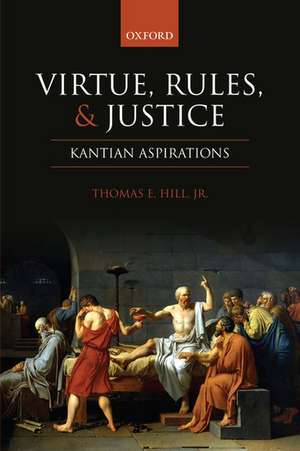Virtue, Rules, and Justice: Kantian Aspirations
Autor Thomas E. Hill, Jren Limba Engleză Paperback – 31 mai 2012
| Toate formatele și edițiile | Preț | Express |
|---|---|---|
| Paperback (1) | 326.42 lei 32-37 zile | |
| OUP OXFORD – 31 mai 2012 | 326.42 lei 32-37 zile | |
| Hardback (1) | 807.51 lei 32-37 zile | |
| OUP OXFORD – 31 mai 2012 | 807.51 lei 32-37 zile |
Preț: 326.42 lei
Preț vechi: 401.21 lei
-19% Nou
62.46€ • 65.35$ • 51.89£
Carte tipărită la comandă
Livrare economică 24-29 martie
Specificații
ISBN-10: 0199692017
Pagini: 384
Dimensiuni: 155 x 234 x 21 mm
Greutate: 0.39 kg
Editura: OUP OXFORD
Colecția OUP Oxford
Locul publicării:Oxford, United Kingdom
Descriere
Thomas E. Hill Jr. interprets, explains, and extends Kant's moral theory in a series of essays that highlight its relevance to contemporary ethics. The book is divided into four sections. The first three essays cover basic themes: they introduce the major aspects of Kant's ethics; explain different interpretations of the Categorical Imperative; and sketch a "constructivist" reading of Kantian normative ethics distinct from the Kantian constructivisms of Onora O'Neill and John Rawls. The next section is on virtue, and the essays collected here discuss whether it is a virtue to regard the natural environment as intrinsically valuable, address puzzles about moral weakness, contrast ideas of virtue in Kant's ethics and in "virtue ethics," and comment on duties to oneself, second-order duties, and moral motivation in Kant's Doctrine of Virtue. Four essays on moral rules propose human dignity as a guiding value for a system of norms rather than a self-standing test for isolated cases, contrast the Kantian perspectives on moral rules with rule-utilitarianism and then with Jonathan Dancy's moral particularism, and distinguish often-conflated questions about moral relativism. Hill goes on to outline a Kantian position on two central issues. In the last section of the book, three essays on practical questions show how a broadly Kantian theory, if critical of Kant's official theory of law, might re-visit questions about revolution, prison reform, and forcible interventions in other countries for humanitarian purposes. In the final essay, Hill develops the implications of Kant's Doctrine of Virtue for the responsibility of by-standers to oppression.
Recenzii
Overall, this book would be a helpful aid for those looking for clear explanations of Kants ethics, situated in relevant secondary literature and contrasted with other ethical theories, and those curious about how we can apply Kants normative ethics to contemporary issues.
Notă biografică
Thomas E. Hill, Jr., received an AB from Harvard College, a BPhil as a Rhodes Scholar from the University of Oxford, and a PhD from Harvard University. He is author of Autonomy and Self-Respect (CUP), Dignity and Practical Reason in Kant's Moral Theory (Cornell University Press), Respect, Pluralism, and Justice (OUP), and Human Welfare and Moral Worth (OUP). He edited the Blackwell Guide to Kant's Ethics (Wiley-Blackwell)and, with Arnulf Zweig, co-edited Kant's Groundwork for the Metaphysics of Morals (OUPs). He taught briefly at the Johns Hopkins University and Pomona College, at UCLA for sixteen years, as a visitor at Stanford University and the University of Minnesota, and is currently Kenan Professor in philosophy at the University of North Carolina atChapel Hill. His essays explore a wide range of topics in moral and political philosophy, with special interest in Kant and broadly Kantian perspectives on practical issues.
























